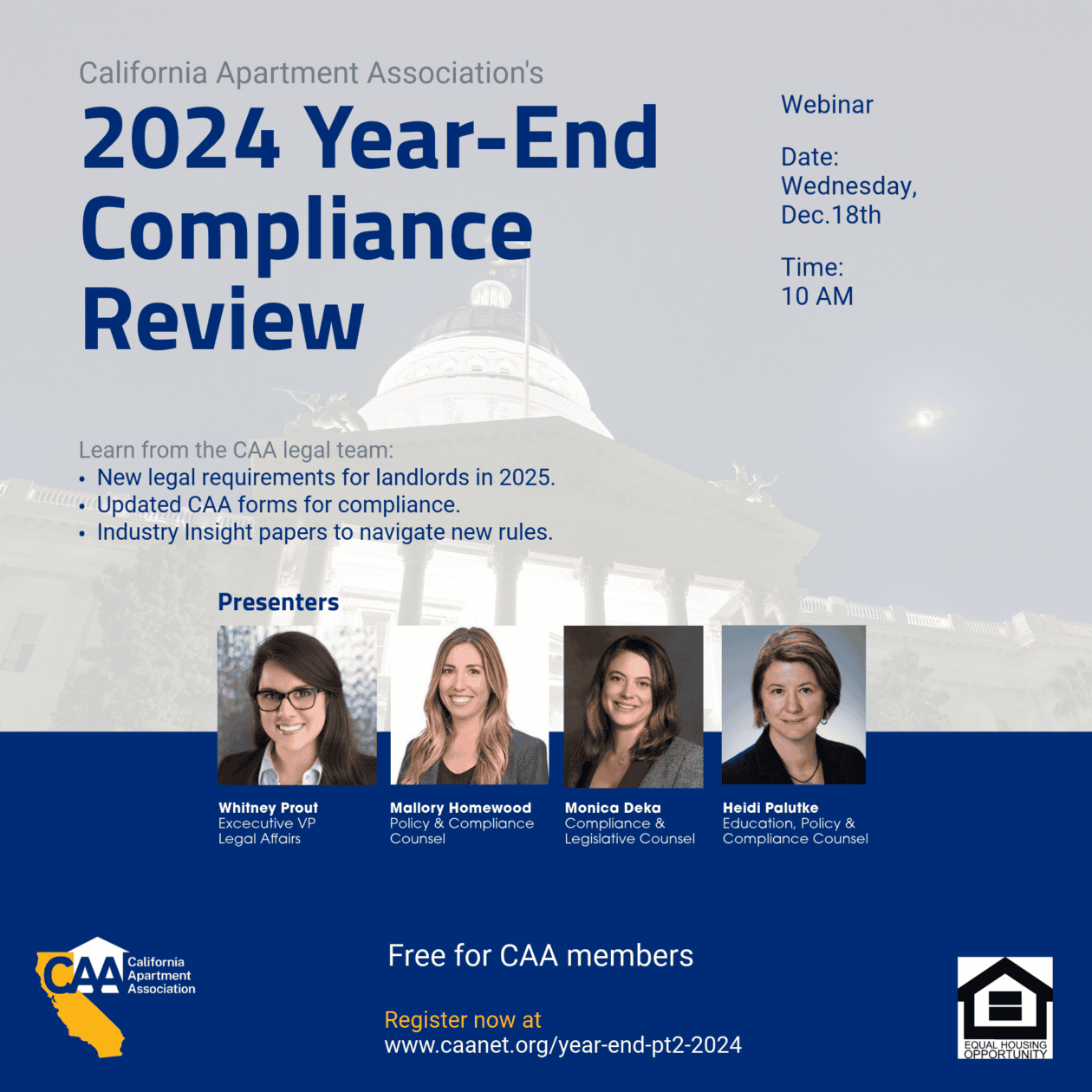The California Apartment Association’s 2024 Year-End Legislative Report, now available on demand, provided a detailed overview of the new laws impacting rental housing providers starting in 2025.
The session also previewed a second webinar in the series, scheduled for Dec. 18, which will focus on compliance tools, updated forms, and resources to help landlords adapt to these legal changes.
During the webinar, Debra Carlton, CAA’s executive vice president of state public affairs, explained, “There were over 3,000 total bills introduced by the legislature. Over 1,000 of those bills were signed by the governor, and 189 bills were vetoed by the governor.” Carlton highlighted that CAA’s advocacy involved an extensive review process: “CAA has an extensive process of reviewing every single bill that’s introduced. [We] actually took a position on 126 total bills and lobbied 70 bills that went to the governor.”
Meet the Speakers
Debra Carlton
Executive VP, state public affairs, CAA
Embert P. Madison Jr.
State advocacy and compliance counsel, CAA
Whitney Prout
Executive VP of legal affairs, CAA
The discussion also featured insights from Whitney Prout, CAA’s executive vice president of legal affairs, and Embert P. Madison Jr., CAA’s state advocacy and compliance counsel. Together, they analyzed how the legislative session and the new laws will affect rental housing providers in 2025.
Key laws taking effect in 2025
The webinar covered several new laws, including:
- Security Deposit Documentation Requirements (AB 2801): Landlords must now document security deposit deductions with photographs taken at multiple points during and after the tenancy. These photographs must be shared with tenants using approved delivery methods, such as email or flash drives.
- Positive Rent Payment Reporting (AB 2747): Larger property owners must offer tenants the option to have their positive rental payment history reported to at least one nationwide consumer reporting agency.
- Screening Fee Reforms (AB 2493): This new law outlines specific steps landlords must follow when reviewing applications if a screening fee was charged, such as accepting the first qualified applicant or refunding fees to applicants not selected.
- Fee Prohibitions (SB 611): Landlords are now prohibited from charging fees for delivering notices or for accepting rent paid by check.
- Protections for Survivors of Domestic Violence (SB 1051): Landlords must, at their own expense, change the locks for tenants who provide documentation of domestic violence, stalking, or human trafficking within 24 hours of receiving the request.
- Resources: Industry Insight: Protections for Victims of Domestic Violence and Other Crimes and Updated Rental/Lease Agreements (Forms CA-040 through CA-043).
- Balcony Inspections Deadline Extension (AB 2579): Compliance deadlines for balcony inspections have been extended to Jan. 1, 2026, for buildings with three or more units.
- Resource: Industry Insight: Balcony Inspections.
Prout previewed the Dec. 18 webinar, saying, “We will be covering this in much more detail in part two of this webinar series where we’re going to focus more on compliance.”
Legislative wins
The webinar also highlighted key legislative proposals that CAA successfully opposed or influenced to reduce burdens on rental housing providers:
Carlton emphasized, “We want you to know the work that CAA and our volunteer members did to stop [harmful] legislation. And of course, it may be of no surprise to you that a lot of this legislation will return again.”
- AB 2187: This bill proposed creating an Office of Tenant Rights and Protections to assist tenants exclusively, excluding landlords from its scope. CAA opposed the measure, arguing it would create a one-sided system while adding significant costs to taxpayers. The bill ultimately failed to advance from the Assembly Appropriations Committee.
- AB 2384: A proposal requiring emergency phones at all public pools was halted after CAA raised concerns about unnecessary costs and lack of public necessity.
- AB 2216: Originally seeking to mandate that all landlords allow pets without charging pet rent or security deposits, this bill failed after tenant advocacy groups withdrew their support when amendments provided flexibility for landlords.
- AB 1786: This bill sought to add climate change as a basis for declaring indefinite states of emergency, which could have triggered prolonged price caps and punitive penalties under Penal Code 396. Reflecting on the bill’s implications, Madison said, “The dangerous thing with AB 1786 is that a climate change emergency would extend indefinitely because climate change is now a reality of the world in which we live.” CAA successfully opposed the measure, ensuring it did not advance.
Preparing for compliance
The Dec. 18 Year-End Compliance Review webinar, the second in our year-end webinar series, will provide detailed compliance guidance on these laws, along with updates on CAA’s forms and resources. The live session is free to CAA members and essential for housing providers preparing for the operational challenges ahead. The live and on-demand version of the course is available for $10.
The first part of the series, the 2024 Year-End Legislative Report, is available on-demand to members for $10.





